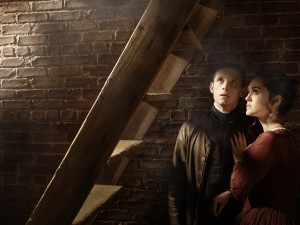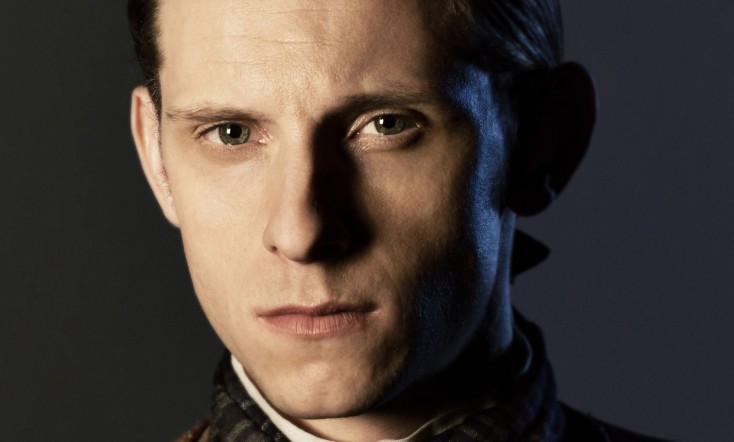By ANGELA DAWSON

Jamie Bell as Abe Woodhull and Heather Lind as Anna Strong in TURN . ©AMC Film Holdings, LLC. CR: Frank Ockenfels 3/AMC
Front Row Features
HOLLYWOOD—It may seem a tad ironic that the main American hero of a new AMC drama about the first colonial spy ring during the Revolutionary War is played by a Brit.
Jamie Bell, best known as the aspiring young ballet dancer in “Billy Elliot,” stars as Abe Woodhull, a farmer living behind enemy lines in British-occupied Long Island. Initially ambivalent about the conflict, Abe eventually joins forces with a group of childhood friends to form The Culper Ring, an unlikely team of secret agents who aid General George Washington in turning the tide of war in favor of the Rebels. The spy series premieres Sunday, April 6 at 9 p.m. ET with a 90-minute episode. The series is executive produced by Barry Josephson and run by Craig Silverstein, both of whom have worked on “Bones,” and is based on author Alexander Rose’s book, “Washington’s Spies: The Story of America’s First Spy Ring,” which detailed the heroic exploits of The Culper Ring.
Bell, 28, became a first-time father with his wife, actress Evan Rachel Wood, while he was in production on the series in Virginia last year. He says, over a plateful of fresh fruit, that he can now more easily relate to the concerns of his TV character, also a young father. He spoke during the Television Critics Association tour earlier this year about playing an 18th century spy and becoming a first-time father.
Q: You must be happy because you’re a dad now?
Bell: I know. It’s so weird because when I was shooting the pilot my character has a kid, and I was only about three or four months away from becoming a father. So it was a weird foreshadowing of what my life was about to become.
Q: Now that you are a parent, how has your life changed?
Bell: You’re not as asleep as you used to be or, because of the lack of sleep you’re more asleep than you previously were. (He laughs.) It’s a blessing, isn’t it? It’s an unbelievable thing that changes you forever. I will always look at children now with nothing but amazement. They’re incredible things that teach us so much about who we are. And when they become massive reflections of yourself, you’re like, “Oh my God, I really screwed up. Oh no, irreparable damage done!” But I’m thrilled. I’m over the moon because I love him.
Q: Congratulations on this show as well. How did this project come about?
Bell: It’s weird. I always hated period dramas. (He laughs.) I did a version of “Jane Eyre” a few years ago. Then, they sent me the pilot script for this, and I thought, “Another Bronte! Mr. Darcy up the ***.” There’s so much of it. It’s dull. We all grew up with them. We’ve all sat through them. Bizarrely, I found that’s all I do. I’m always, like, in a weird period of history. But with this, it was the character. The time period and all that stuff, I didn’t really know that much about it going in. So I needed the dictionary with me as I was reading the pilot so I’d know what all the words meant. Literally, I didn’t know what some of the words meant.
Q: And all those wars during that time could be confusing, right?
Bell: Yeah. But ignoring all of that, the character was really the thing I was interested in. I liked the idea of a time that required, if you were to win or succeed, someone to really step up to the plate, and all this character does is step backwards. He just retreats all the time, and he makes the wrong decisions, and he betrays himself a lot of the time. He betrays his own beliefs and passions, his loyalties to the people he supposedly loves. He just constantly betrays them. I just thought that was an interesting character to set in this time. You would think it would require real heroes and people who did step up to the plate, and people who did sacrifice so much, and this character, because of various reasons, doesn’t do it. Throughout the show, as we progress, he obviously will, I’m assuming. But the initial challenges that he faces, especially in the pilot, I thought were very interesting.
Q: What did you learn about this time period?
Bell: Washington’s army is ****. They were just crap at war, basically, and the British were stupid, because if they had just kept going a lot of the time in their battles, instead of pulling back, they would have won. So many times—and this is in Alex Rose’s book and David McCullough’s book, “1776”—they stopped when they should have advanced. They stopped and said, “Just let them go. They’ll be back for more and we’ll smash them.” They were lazy. Washington was really good at evading, shape-shifting and just moving around. That’s the backdrop for the show. What’s up front are an oppressed people who try and rise up. What happens in those situations is families are torn apart because loyalties lie in different places, and quite ordinary people are required to do extraordinary things. That’s where this show’s heart is. It’s the sense that these people are required to do something incredibly noble under such pressure. Then it’s also the origin of something we know now as espionage. It’s essential now in all warfare. It’s essential in all politics. It’s essential in currency. It’s essential in stock markets. It’s essential in everything, maybe even movie studios. They’re all spying on each other. We all want to know what’s going on with each other. We want to have the upper hand.
Q: Are actors are spying on each other?
Bell: (joking) Yeah, I want to know why Andrew Garfield… no, I don’t want to know that. As a culture, we’re so intrigued by espionage; we’re so involved with it that it’s a part of our makeup. I do it on Facebook. I want to know what my mom’s doing. I’m spying on her. So this show is where it begins. It starts with the necessity of winning a war and freeing a country, with incredibly high stakes. It’s that element of the show that gives us an edge and, hopefully, will keep people interested.
Q: You’re known for not watching your own work, but have you watched any of this?
Bell: Literally, they bent my arm. I watched the pilot, and believe me, I’m the worst critic ever. I had a paper with two columns that I wrote: “working” and “not working.” I was amazed because I was sure that my pen would drift over into that right column. But I was surprised that the show is so well cast.
Q: Has it changed your perspective? Can you watch it objectively?
Bell: No. I think what AMC does really well is that they cast shows well and appropriately. We have so many different faces and so many different characterizations of these people. It’s very rich and the tapestry of it is so great, that that was the thing that really stood out to me. All of these people brought so much to their character and there is such a range and variety of characters. For me, it was the best part about the pilot, which is that I could watch these people for a while.
Q: When you’re playing a spy in the 18th century, there are no references. How was it?
Bell: You have to realize that he starts out as a farmer. So as a spy, he’s not very smart or clever because he’s never done this before. He keeps making mistakes and he almost reveals secrets that he shouldn’t. So that’s the place we have to start. No one knows how to do this, especially him. It’s that sense of discovery in the pilot, when he finds out how it works. To Edward Snowden or Julian Assange, it wouldn’t be a big deal. But to Abe, he doesn’t realize that what he’s doing could change the world. It’s that primitive. I think we have to keep the character aligned with, “we don’t know how to do this” and not make him too clever too quickly. For a long time, we don’t know what side he’s really on. It would be super-boring if he suddenly found his patriotism.
Q: How has it been working in Virginia this winter?
Bell: It’s freezing. We actually had to cancel a couple of days shooting because it was really cold. We have a lot of extras on the show too.
Q: It’s a big production, isn’t it?
Bell: Yeah. It’s bigger than some movie sets I’ve been on. I’ve done some big movies, but a lot of the movies I’ve done are small, independent movies. You think, “Oh TV, it’s a different deal.” But it’s actually huge. The undertaking is massive. What we have there is some access to some incredible colonial buildings. We’re actually shooting at a house where Thomas Jefferson spent his childhood. I was playing soccer there. I felt terrible because these are like genuine registered historical buildings, and I’m playing soccer there. But the fact that we have that as a backdrop for the show is amazing. I would be hard-pressed to where else we could shoot the show. There is a sense of some history there, which is kind of difficult to find sometimes. In New York, you can find it in little pockets there, but it’s disappearing. That’s what is amazing about Virginia. You see these signs that say, “Civil War trench here.” And it had major significance. This is where it took place—all along the Northeast corridor is where it all went down. So we’re very lucky to have that at our disposal.
Q: Are there good British and bad Americans that will be in this?
Bell: I think we’ll have to do that. That’s what the (TV miniseries) “John Adams” did well, actually. In the first episode, they established the colonists as the ones who were really ready for a fight. So I hope that the British (in “Turn”) won’t all be malevolent bad guys preying upon these timid people, who can’t defend themselves. I’m sure (executive producer/showrunner) Craig Silverstein will figure that out.





